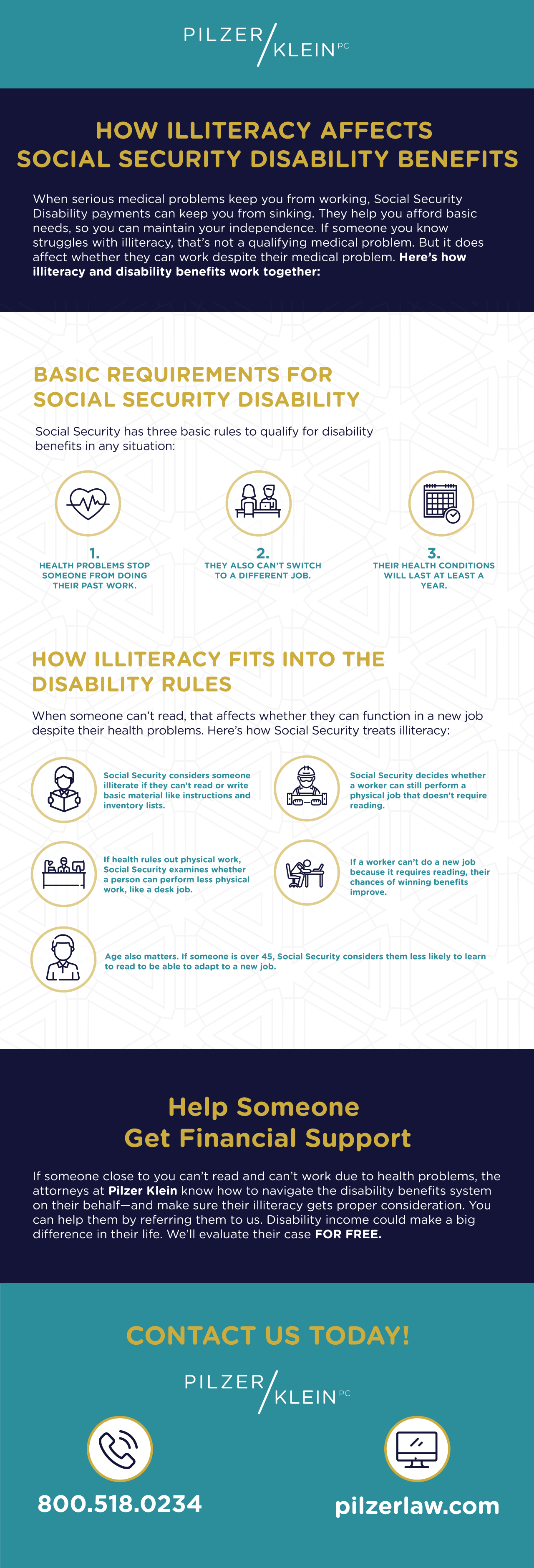Disability Help for People Who Can’t Read
If you have a family member or friend who cannot read or write and has a serious health condition that prevents them from working, monthly income from Social Security Disability benefits could make a big difference in their life. And their illiteracy could make it easier to get benefits.
To win disability benefits, you’ve got to have a serious medical condition that leaves you unable to work. A Greenville Social Security lawyer can help you understand the requirements it will take to apply for disability.
Illiteracy is not a medical condition. It’s an education level. But in deciding whether you’re able to work, Social Security may give special consideration to someone who can’t read or write. While your health problems prevent you from working certain jobs, being unable to read rules out other jobs.
It’s hard winning Social Security Disability benefits. Most people initially get denied.
You could benefit from a having lawyer who knows how to handle the special challenges surrounding illiteracy. The South Carolina disability lawyers at Pilzer Klein have helped thousands of people win disability benefits.
We’ll evaluate your case for FREE.
Get My Free Case Consultation!
How Does Illiteracy Affect Disability Benefits?
These are the basic qualifications Social Security uses to decide if you officially have a disability:
- Your health problems stop you from doing the work you’ve done before.
- You’re unable to adjust to other work because of your medical conditions.
- Your physical or mental health problems will last at least a year.
Illiteracy enters the picture when Social Security decides whether you could do any work, not just the work you did before.
Social Security considers you illiterate if you’re unable to read or write a simple message, “…such as instructions or inventory lists.”
You might install roofs, work on road crews or clean houses without being able to read or write instructions or inventory lists.
If you physically can’t do those jobs anymore, Social Security will ask if you could do another job, like a desk job that requires reading and writing.
So if you can’t read, Social Security’s more likely to decide you can’t work any job.
For help proving this to Social Security, contact us now.
Greenville Illiteracy and SSD Benefits Lawyer Near Me
(864) 235-0234Your Age Makes a Difference with Social Security Disability and Illiteracy
Sometimes you have a medical condition that Social Security officially recognizes as a qualifying disability.
But if you don’t match that, Social Security looks at your age, education level and “residual functional capacity.” Your residual functional capacity, says Social Security, “is the most you can still do despite your limitations.”
Your age makes a difference in this decision. If you’re under 45, Social Security won’t consider your illiteracy as a factor qualifying you for disability benefits.
Social Security thinks younger people could be trained for other work or still learn to read and write.
So it’s harder to win benefits for people under 45. Over 45, Social Security is more likely to recognize that illiteracy is harder to overcome.
Get Professional Help with Your Disability Application
Applying for disability benefits involves many forms and complicated steps.
Someone who can’t read or write will need help. Really, anyone can benefit from getting a professional to prepare their application, gather the needed evidence and build their case.
Lawyers who focus on Social Security Disability cases know the system and help you avoid mistakes that cause delays or denials.
For someone unable to read, experienced lawyers might closely question vocational experts who testify at a disability hearing about job possibilities.
The lawyers at Pilzer Klein focus on Social Security Disability, dedicate themselves to helping people in the Carolinas and stay loyal to their clients from beginning to end.
You’ll pay NO FEE unless you win benefits.
Call or text (864) 235-0234 or complete a Free Case Evaluation form







